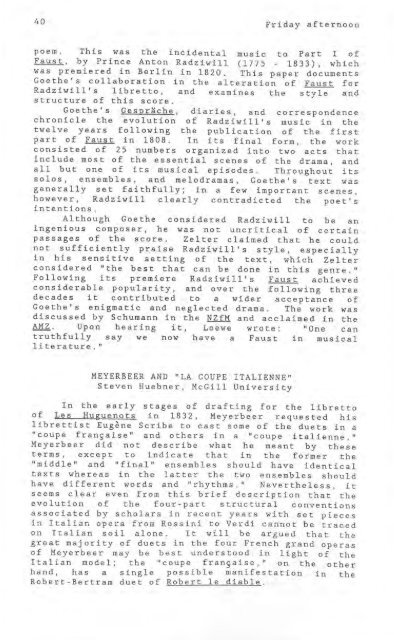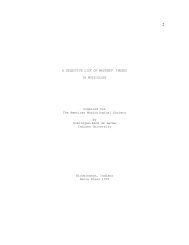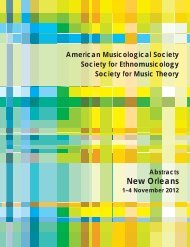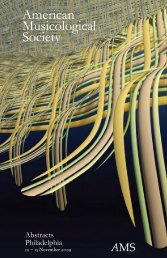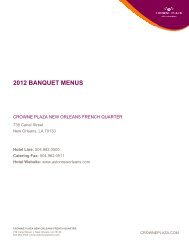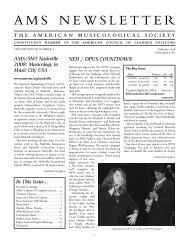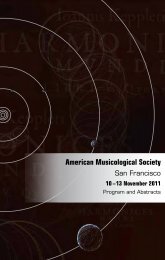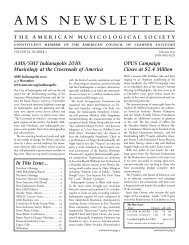Abstracts - American Musicological Society
Abstracts - American Musicological Society
Abstracts - American Musicological Society
Create successful ePaper yourself
Turn your PDF publications into a flip-book with our unique Google optimized e-Paper software.
40 Friday afternoon<br />
poem. This xTas the incidental nusic to part I of<br />
Faust, by Prince Anron Radziwill (1,775 _ 1833), which<br />
was prerniered in Berlin in 1820. This paper documents<br />
Goethers collaboration in the alteration of Faust for<br />
Radziwill's libretro, and examines the<br />
and<br />
st!ucture of this score.<br />
Goethe's Gesprdche, diaries, and correspondence<br />
chronicle the evolution of Radziwill's rnusic in the<br />
twelve years following the publication of the first<br />
part of Faust in 1808 . In its final form, the work<br />
consisted of 25 nurnbers organized into two acts that<br />
include most of the essential scenes of the drana, and<br />
all but one of its rnusical episodes. Throughout its<br />
so1os, ensembles, and melodrarnas, Goethe,s text was<br />
generally set faithfully; in a few important scenes ,<br />
however, RadziwiIl clearly contradicted. the poet, s<br />
intentions.<br />
Although Goethe considered Radziwill to be an<br />
ingenious cornposer, he was not uncritical of certain<br />
passages of the score. ZeLxer clairned that he could<br />
noc sufficiently praise Radzir,rill's style, especially<br />
in his sensitive setting of the text, which ZeIter<br />
considered "the best that can be done in this genre."<br />
Following its premiere Radziwill's Faust achieved<br />
considerable popularity, and over the following three<br />
decades it contributed to a wider acceptance of<br />
Goethe's enigmatic and neglected drama. The work was<br />
discussed by Schurnann in the NZfM and acclaimed in the<br />
AITZ. Upon hearing it, Loewe wrote: "One can<br />
truthfully say r,re now have a Faust in musical<br />
literature - "<br />
MEYERBEER AND 'LA COUPE ITALIENNE"<br />
Steven Huebner, McGi11 University<br />
In the early stages of drafting for the libretto<br />
of Les llgguenots in t832, Meyerbeer requested. his<br />
librettist Eugdne Scribe to cast some of the duets in a<br />
"coupe frangaise" and others in a ,'coupe italienne. "<br />
Meyerbeer did not describe what he meant by these<br />
terms, except to indicate that in the former the<br />
"niddIe" and "fina1" ensembles should have identical<br />
texts rrhereas in the latter the two ensenbles should<br />
have different words and "rhythrns.,, Nevertheless, it<br />
seems clear even fron this brief description that the<br />
evolution of the four-part structural conventions<br />
associated by scholars in recent years with set pieces<br />
in ltalian opera frorn Rossini to Verdi cannot be traced<br />
on Italian soil a1one. It wilI be argued that the<br />
great najority of duets in the four French grand operas<br />
of Meyerbeer may be best understood in light of the<br />
Italian rnodel; the "coupe frangaise, " on the other<br />
hand, has a single possible manifestation in the<br />
Robert-Bertram duet of Robert 1e diable<br />
";tl;


